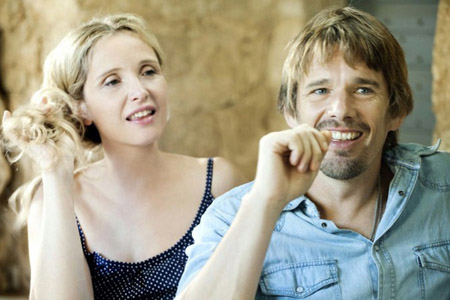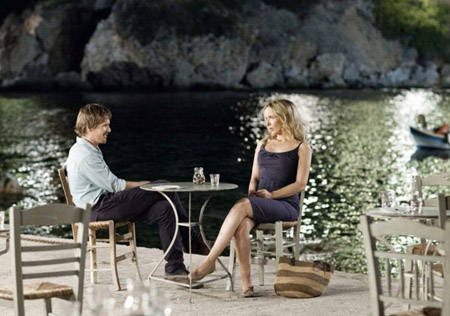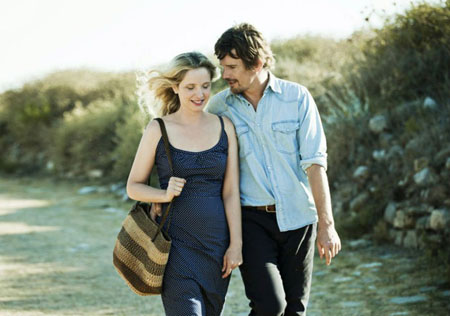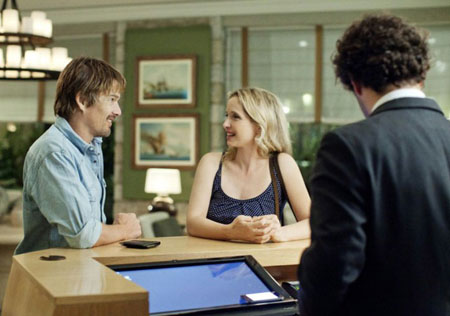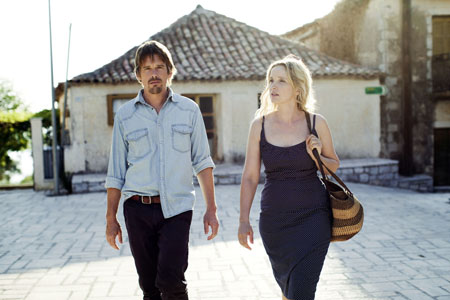“One of the great movie romances of the modern era achieves its richest and fullest expression in Before Midnight,” announces Variety‘s Justin Chang. “Exquisite, melancholy, hilarious and cathartic, Richard Linklater‘s third walking-and-talking collaboration with Ethan Hawke and Julie Delpy turns a summer night’s Grecian idyll into a typically digressive and cumulatively overwhelming essay on the joys and frustrations of (spoiler alert!) long-term commitment and parenthood…. If 1994’s Before Sunrise was a touching paean to possibility and 2004’s Before Sunset a piercing ode to regret, then Before Midnight encompasses all these feelings and more within a full-bodied portrait of a devoted couple facing early middle-age. A marvel of narrative compression, the screenplay (like Sunset, written by Linklater, Hawke and Delpy) is equal parts naturalism and exposition, strategically updating the audience on the characters’ busy lives while keeping immediacy and spontaneity at the fore.”
“As prefigured by the plane Jesse missed at the end of Sunset, he and Celine are a couple now, unmarried but with angelic twin daughters,” explains Sam Adams at the AV Club. “They’re nearing the end of a six-week stay in Greece, and for their final night, their friends have conspired to provide them with a romantic night alone. But first (and second and third), there’s talk: lots of it…. Rather than rekindling their romance, their evening alone allows quarrels usually masked by the hubbub of everyday life to make their way to the surface, reminding us that as relationships grow, so do their difficulties. It’s hard to separate Before Midnight‘s virtues as a stand-alone film from its place as the capstone on an extraordinary trilogy, but either way it’s an immensely satisfying and emotionally rich experience, so true to life that you nod and wince at the same time.”
“If the first film ended with us wondering if the two would actually keep their ‘we’ll meet in six months’ date, and the second wondered if Jesse would give in to temptation, Before Midnight offers the possibility that the couple’s odds-defying relationship will end in a one-day conflagration of pent-up resentment and parental guilt,” writes John DeFore in the Hollywood Reporter. “The previous films’ manufactured deadlines—a train departure, a trip to the airport—are no longer with us; the pair are now together until they decide not to be. Turns out, that’s as dramatic as a ticking clock.”
“Linklater has completed one of the finest movie trilogies of all time,” declares Indiewire‘s Eric Kohn. What’s more, Before Midnight “magnifies the experience of self-examination with greater emotional weight than its predecessors.”
Tim Grierson for Screen: “Before Midnight argues that romance is easy—deep, committed love is a far more treacherous, but also more rewarding, pursuit. By seeing that reality clearly, they’ve made a complicated, meandering but also wonderful film.”
But for Damon Wise, writing for the Guardian, “where the magic of the first two films was the charming disjunct between the warring outlooks of the American and the European, Before Midnight makes this rift much more literal and much less fun…. There are moments of truth and comedy for sure, and many long-standing couples will recognise themselves at several points in this awkward night of reflection. They may not, however, identify with the relentless talking-for-talking’s sake, and the main problem with Before Midnight is that there is very little pause.”
“While not the most fun or sexiest film in this trilogy—do you want to watch mom and dad fight for 30 minutes straight?—it’s easily the most necessary, and it’s the logical extension of where this relationship story should and must go,” counters Rodrigo Perez at the Playlist.
And In Contention‘s Kristopher Tapley is left with “a burning desire to see where they are in nine more years.”
Updates, 1/23: Dispatching to Time Out New York, David Fear argues that Before Midnight “mirrors how life deepens the conversations and thoughts one has; gone are the days of discussing whether Tolstoy is better than Gogol, or even whether one should have taken a chance on another person after a gamechanging train ride. Now, they chew over notions of lost passion, smothered desire, why having the one true love next to you is occasionally not enough. The conversations we’re lucky enough to eavesdrop on this time out are profound ones, and offer more Big Questions than know-it-all answers. It would be easy to say that it’s this willingness to tackle heavier concerns is what makes this the superior movie of the three. Yet that doesn’t quite hit the mark: The movie is the best entry of the bunch because it reflects change—their change, our change—in a way that honors these flawed fictional characters and real life without pulling any punches. It’s funny, touching and, in keeping with Linklater & co.’s past attempts to mine the personal, all too identifiable. It’s also, inarguably, a masterpiece.”
“[A]s with estranged kindred spirits, we don’t realize how much we’ve missed these loquacious lovers until we’re in their company again,” writes Time Out Chicago‘s A.A. Dowd. “First in a car—shades of Kiarostami—then among friends, and finally on the streets of Greece, the two fall back into the sparkling, lightly philosophical banter that’s come to define this wonderfully wordy franchise. Nobody writes dialogue—funny, thoughtful and organic—like the power trio of Linklater, Hawke and Delpy.”
“It’s a pleasure to be in these characters’ company again,” agrees Kyle Buchanan at Vulture, “but their formerly equal partnership is upended this time to favor Delpy, who cracks blue jokes, dominates Hawke in every argument, and runs through a showy gamut of emotions in a performance that deserves awards consideration. The ‘Julie Delpy for Best Actress’ campaign begins now!… Linklater is said to have spent the last decade shooting a film that charts a young boy’s growing of age, with the neat trick that a segment is shot every year, meaning the audience can eventually watch the actors age dramatically once the film is completed. He’s a filmmaker, then, unusually obsessed with aging; it’s no wonder that he’s also been trying to mount a follow-up to Dazed and Confused, a movie that already suggested an interest in this theme with Matthew McConaughey’s sly line, ‘That’s what I love about these high-school girls, man. I get older; they stay the same age.'”
“Hawke and Delpy… have reached a level of comfort and familiarity with both their roles and each other that makes for the most exposed and daring portrayals of the characters in all three films,” writes Zeba Blay at the House Next Door. “Like its predecessors, Before Midnight‘s derives its success from the unsentimental alchemy of its frank dialogue, chemistry between its two leads, and Linklater’s deceptively simple visual style. Nostalgia isn’t just part of the film’s charm, it’s also its muse.”
Scott Renshaw for Salt Lake City Weekly: “Before Sunrise was about romance; Before Sunset was about longing. What Before Midnight reveals is that, for the first time in the series, we’re seeing a story about love.” And at Slate, Tim Wu agrees that it “approaches perfection.” More from Drew McWeeney (HitFix) and Anne Thompson.
Update, 1/26: “Sony Pictures Classics has scooped up the movie in a deal that is apparently worth seven figures, and is likely one of the big buys of the fest,” reports the Playlist‘s Kevin Jagernauth.
Updates, 2/3: “To give the full extent of this conversation would rob the viewer of the experience of watching it unfold,” writes Jacob Mertens in Film International. “I will say, however, that I have never seen a film come closer to the genuine tenor of an argument. And not just any argument, but one between two people who love each other and who have spent too much time together. An argument in which both responsible parties know each other’s weaknesses and do not know when to relent.”
“There is absolutely nothing not to love about Before Midnight,” writes Ryland Aldrich at Twitch.
Update, 2/4: Sunrise and Sunset “can’t quite compare to this latest entry, the best and most emotionally potent outing we’ve seen yet,” writes Nicholas Bell at Ioncinema. “One can’t quite (and shouldn’t) consider this to be the absolute last we’ll see of these beloved characters, as another decade down the road may very well produce another chapter, but as far as worthwhile and natural progression goes, Linklater and crew would be hard pressed to best Before Midnight.”
Update, 2/7: “Of the Sundance generation filmmakers my own age, Steven Soderbergh, Quentin Tarantino and [Todd] Haynes (and several others of prominence), Linklater has produced the most effortlessly great, idiosyncratic and satisfying outputs,” writes Patrick Z. McGavin. “I walked out of the press screening at Holiday Village believing the new work is the greatest work of the Austin-based independent.”
Update, 2/13: At the Film Society of Lincoln Center, Brian Brooks has notes on the Berlinale press conference: Linklater, Delpy, and Hawke were all there.
Updates, 2/16: “Delpy and Hawkes are fiercely honest here, allowing their endearing characters to expose their worst qualities in addition to their best,” writes Adam Cook in the Notebook. “Dominated by effortless long takes with pages and pages of dialogue, Midnight is as much a directorial triumph as it is a stage for its performers, with the graceful touches of beauty the director has always seemed to get away with without notice.” And he’s discussed the film with Karsten Meinich and Lars Ole Antikristiansen (of Montages and MUBI Norway) and Andrew Grant.
The Playlist‘s Jessica Kiang‘s been in on a roundtable interview with Delpy and Hawke.
Update, 2/21: Linklater tells the Playlist‘s Jessica Kiang: “Julie and Ethan, people think it’s real, they think we just turn on a camera and we capture these dialogues. You know, ‘acting’ is Daniel Day Lewis playing Lincoln—that’s acting. And I’m not saying it isn’t, it’s good acting, but that’s seen at a different level, when it really isn’t. This is actually harder, I think.”
Update, 3/3: “This latest effort doesn’t merely deepen our understanding of Jesse and Celine and treat us to another funny-melancholy consideration of the agonies and glories of romance,” writes Christopher Kelly in Texas Monthly: “it expands our very notion of what a trilogy can be. On the one hand, the Before films function as an almost documentary-like illustration of time’s inexorable passage (the most obvious comparison is Michael Apted’s Up series of British docs, which revisits its interview subjects at seven-year intervals). On the other, Linklater’s trilogy is richly cinematic and quietly groundbreaking: using the same actors and basic structure but employing the tropes of different genres, Linklater has come arguably closer than any director to creating a kind of symphony onscreen. The Before movies are each distinct movements that introduce new themes while hauntingly circling around a set of common ones.”
Update, 12/22: Kyle Buchanan talks with Linklater for Vulture: “I think by sheer volume, Jesse and Celine’s hotel room fight was the toughest scene to write. The whole film leads to it: From the very first scene in the movie, we’ve revealed a fault line in their relationship, and what we experience in the hotel room is the full maturation of the idea. This fight started years ago, and we’re just dropping in on this month’s version.”
Update, 1/7:
Richard Linklater, Julie Delpy & Ethan Hawke on Their ‘Before’ Trilogy from The Credits.
Sundance 2013: Index to our reviews, reports, and coverage of the coverage. For news and tips throughout the day every day, follow @KeyframeDaily on Twitter and/or the RSS feed. Get Keyframe Daily in your inbox by signing in at fandor.com/daily.

